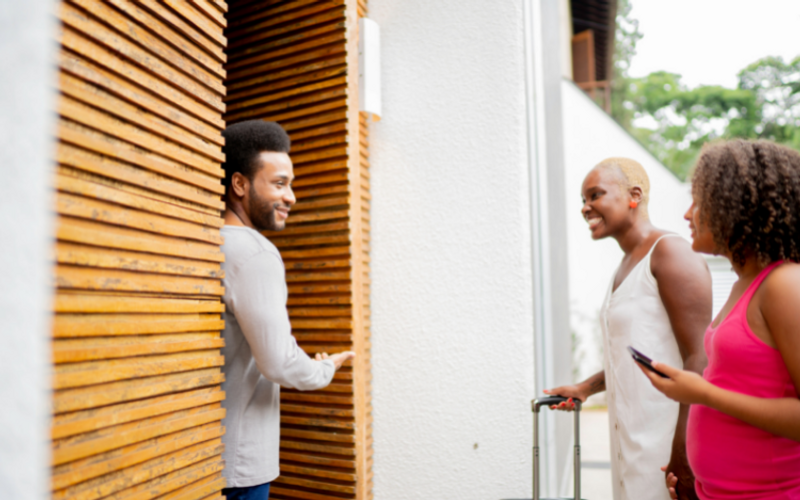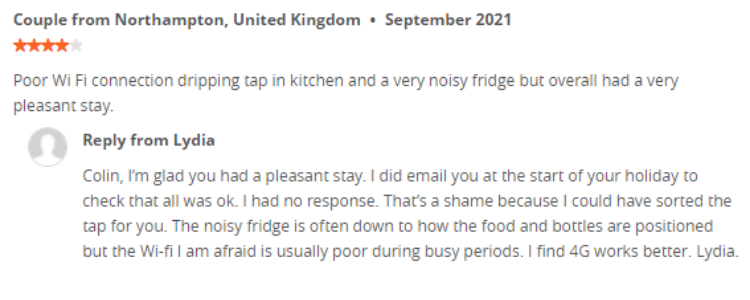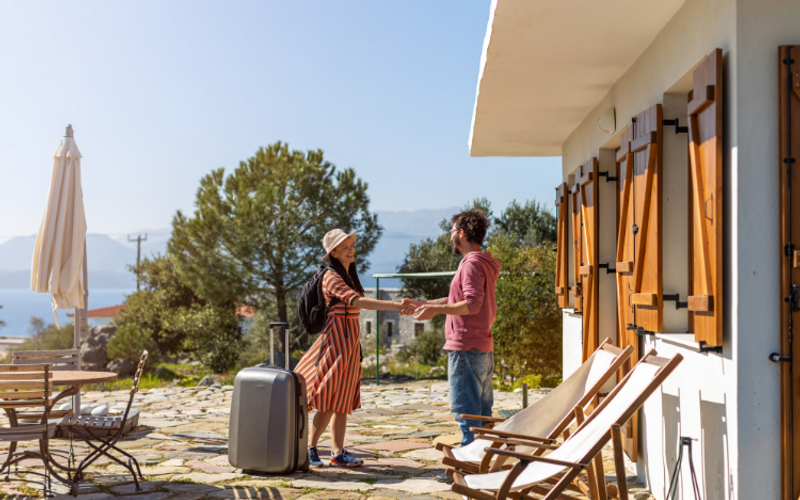Why You Should Accept Direct Bookings
11 October 2021 - 9 mins
11 October 2021 - 9 mins

For all the thousands of vacation rental owners who have been taking direct bookings for years – even as far back as the pre-internet dark ages (!), there are thousands more who only started to let out their spare room, annexe or holiday home for the first time through one of the big platforms, such as Airbnb or Booking.com.
Whilst these platforms have a huge marketing budget and are great at getting eyes on properties, they are not the only possible way to take bookings. They have strict, rigid rules and take a large percentage of the booking cost. But there is another way; guests book your property through your own website or with you directly.
Here’s why you should consider accepting direct bookings.
Bookings that you receive through a third party will be subject to their cancellation terms. Normally, this probably works fine – after all, if your guest cancels the day before they are due to arrive you won’t possibly have time to get a replacement booking, and you might have already prepared the property for their arrival; you’d be out of pocket if you refunded.
However, there are subtleties to this, and as with everything “direct booking” – it should be up to you whether you choose to refund or not!
Imagine a guest makes a booking at your property for next year. A few days after paying the deposit, the guest revisits your property page and realises your pool isn’t heated, or that all the rooms are doubles whereas they wanted twin rooms. They ask to cancel. Typically, with a platform booking, they would forfeit their deposit in this scenario, but perhaps you wouldn’t want them to – you feel the renter has made a genuine mistake, and after all you’ve got a whole year to fill the same week.
In either scenario, the point is – it’s up to YOU whether you refund or not, the decision isn’t imposed on you.
No matter where your guests come from – direct, or through one of the big booking platforms – there’s nothing to stop you asking them if they’d like you stay in touch. But there is no doubt that this is much easier with guests that have booked with you directly, as the OTAs do everything they can to prevent you from getting the direct contact details of your guests.
With your direct booking guests’ permission, build up a mailing list of happy customers. They can be the first you tell about next year’s prices and availability, or any last-minute weeks you have free. Wish them merry Christmas and get them talking about booking your place with their family over the festive period! Let them know about the hot tub you added this year. Offer them a special loyalty discount if they book early. And be sure to ask them for referrals – they might tell all their friends about your place, if you ask them to.
However you stay in touch, having your own personal database of loyal customers can only be useful.

No-one knows your holiday home like you do, and you know the sort of people who love it. Wouldn’t it be nice to get to know the people who make an enquiry with you a little better before you accept their booking, just to check that your expectations and theirs align?
You’ve probably experienced that sinking feeling when you realise the group who has arrived at your rental has vastly different expectations. Perhaps the “perfect for children” games room you mention means they were expecting a giant flat-screen television and Playstation, whereas you’ve got a table-tennis table and Monopoly. Perhaps the short stroll to the beach you describe takes them twice as long as they aren’t keen walkers. No-one is at fault in these scenarios, but there has been a mismatch of opinions which could easily have been avoided with direct, open communication between both parties before any booking was made.
If you accept direct bookings, you also have free control over how you communicate with potential guests – why not grab their number and have a chat with them, or start a conversation on WhatsApp?
With direct bookings, even if a renter makes a booking request, you still have time to talk to them and vet them before deciding to accept. And if you decide not to accept, you won’t be penalised for declining their booking. It’s your free choice.
Because you’ve had the chance to get to really know the renter before the booking starts, you can customise the experience to them. Found out that your renter is staying over a birthday? Leave a birthday card! Did your guest ask a lot of questions about the famous author that was born in the nearby town? Leave a copy of their book on the coffee table. Recommend local restaurants that you think they’ll like, based on what you’ve chatted about with them.
Not only does it feel nice to be able to provide this sort of personalised service, you are more likely to encourage a good review from your guests, as well as increase the likelihood of them recommending you to their friends and family, and even booking with you again.
You’ll pay no commission fees on direct bookings, of course.
It’s a win-win situation, because without adapting your prices at all, the guest pays less, and you earn more.
The big platforms are great for exposure, and great for getting bookings – but do remember that this comes at a cost. So if you want to give away less of your hard-earned cash, you should at least have direct booking as one of your options.
And it’s up to you whether you keep this extra money (or even raise your prices; it’ll still be cheaper to book direct), pass it on as a saving to your renters, or use it to add a little something else to your offering – an extra bottle of wine and a box of chocolates in your welcome pack, for example!

What if the platform you rely on suddenly changes their algorithms and you are plunged to the bottom of the listings? Worse, they arbitrarily decide you’ve broken a rule and block you from the site?
The likelihood of something going majorly wrong with the big platforms – them going out of business, for example – is very low. But better to be safe than sorry, and having your own direct booking system at least gives you options.
You know how nerve-wracking it is, waiting for a review to come through from your most recent guest. You might not have heard anything from them during the stay – is this good news, or bad? You know you have a great holiday home, but what if they didn’t like it?
The truth is, you are confident that you have advertised your property accurately. You know that your place is clean and fully equipped. But it’s still possible that for some reason, the guest was not happy. If they have booked directly with you, they can tell you this. Great! All feedback can be useful. They can possibly even leave a review on your direct booking site that reflects this. Still not a problem; you can answer them and future renters can see your response and judge for themselves.
The real difference is that with a direct booking, getting negative feedback will at worst be annoying – it won’t stop you being able to take bookings or have your listing blocked, as it can do on an OTA.

Twenty years ago, if you wanted to book a chalet in the mountains, a villa somewhere hot or a city centre apartment… guess what, you contacted the owner directly! Back then you might have even posted a cheque to them or made a bank transfer directly to their account. Things have got more sophisticated since then but this doesn’t have to mean complicated or that the owners have to be just a small cog in a big machine. It’s now easy for owners to use a payment system that allow renters to pay with credit or debit cards securely online – so there’s no worry on their part – but still deal with owners directly, like the good old days.
----------------------
Want to learn more? The Rentalsystems Facebook group is where owners share tips and strategies to increase bookings. It's a great place to talk about direct bookings; the pros and cons, and how to get more.

Want to become a vacation rental marketing pro in ten minutes? Read on!

How to make your direct booking site easy to find from your OTA listings